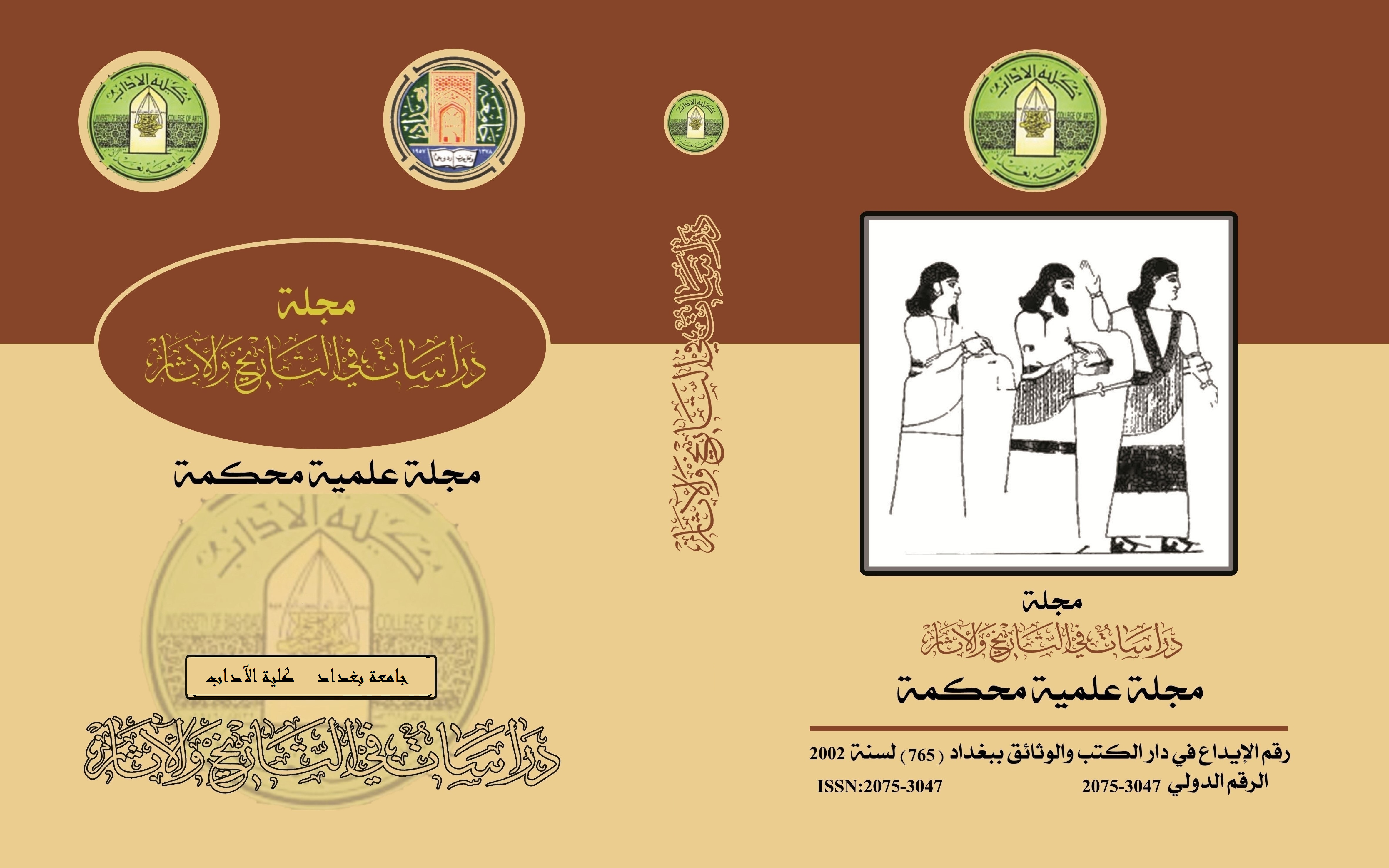ألأســـطورة الرافــدينــية أداة لــتـنظــيم و ضبـط الــمجــتمــع
الكلمات المفتاحية:
الاسطورة، الرافدينية، اداة، تنظيم، ضبط، المجتمعالملخص
ان خلاصة ما يمكن ان نستنتجه من البحث الموسوم (ألأســـطورة الرافــدينــية أداة لــتـنظــيم و ضبـط الــمجــتمــع ) يتلخص بأن الاسطورة في بلاد الرافدين كانت قد وظفت لغرض تنظيم العلاقات الاجتماعية و حماية و تنمية الروابط الاسرية من خلال عرض ادوات و مبررات تتحكم بالمجتمع و تسيطر عليه ،و بما أن للاسطورة اطار مقدس يضع فيه كاتبها كل مايريد أشاعته في المجتمع فيعبر عنه بشكل قصة ابطالها من الالهة، لذا لايمكن تجاوز ما تقرره فهي بمثابة دستور بدائي للسلطة المجتمعية، يتحتم السير وفق قراراتها وعدم معارضتها أو الابتعاد عنها من قبل الافراد من عامة الناس و المسؤولين من الحكام ، لهذا كانت الاسطورة الرافدينية على قدر من الاهمية في حفظ التنظيمات المجتمعية من المنزلقات و الامراض التي تهدد المجتمعات.
المراجع
ابن منظور، ابي الفضل جمال الدين، محمد بن مكرم ،لسان العرب، الجزء2،القاهرة ،1956
ابراهيم، نبيلة،الاسطورة،سلسلةالموسوعة الصغيرة،العدد54 ،بغداد،1979
ابراهيم،نبيلة،اشكال التعبير في الادب الشعبي ،مصر،1974
أحمد كمال زكي، الأساطير،مصر، 1997
أمين، بديعة، فكرة الصراع في الادب السومري،آفاق عربية،العدد7، 1978
أبو بندورة،أنور،القانون و المجتمع في بلاد مابين النهرين،حمورابي مشرعا ومدونا،فلسطين،2006
البروسي،اسماعيل حقي،تنوير الاذهان من تفسير روح البيان،تحقيق محمد علي الصابوني ،المجلد الاول ،دمشق،1989
البيديل،م0ف، سحر الاساطير،ترجمة حسان ميخائيل،دمشق،2005
(بدوي،زكي،معجم مصطلحات العلوم الاجتماعية،بيروت،بدون تأريخ
باقر،طه،مقدمة في أدب العراق القديم،بغداد،1976
الجوراني،وداد،الرحلة الى الفردوس و الجحيم في اساطير العراق القديم، بيروت، 1998
جيمس،ا0أ،الاساطير و الطقوس في الشرق الادنى القديم،ترجمة يوسف شلب،دمشق،1998
الجبوري،صلاح سلمان رميض،أدب الحكمة في وادي الرافدين،بغداد،2000
خورشيد،فاروق،ادب الاسطورة عند العرب- جذور التفكير واصالة الابداع،سلسلة عالم المعرفة،العدد284،الكويت،2002
خشبة،دريني،اساطير الحب و الجمال عند الاغريق ،بغداد،1986
الخطيب،محمد،الانثولوجيا،دراسة عن المجتمعات البدائية،مصر،بدون تأريخ
الزبيدي،محمد مرتضى الحسيني،تاج العروس،تحقيق،مصطفى حجازي،الجزء12،بدون تاريخ
زكي،احمد كمال،الاساطير- دراسة حضارية مقارنة ،بيروت،1979
سعد الدين،كاظم،الحكاية الشعبية العراقية،آفاق عربية،العدد2، 2002
شمس الدين،مجدي،الاساطير،آفاق عربية،العدد9، 1978
الشمس،ماجد عبد الله، تموز و عشتار يصنعان الفصول، آفاق عربية، العدد7، 1985
الشواف،قاسم،ديوان الاساطير،الحضارة و السلطة،الكتاب الثالث،بيروت،1999
الشواف، قاسم ،ديوان الأساطير،سومر و أكاد و آشور، ، الكتاب الرابع ،الموت و البعث و الحياة الأبدية، بيروت،2001
علي، فاضل عبد الواحد، سومر أسطورة وملحمة،بغداد،2000
علي، فاضل عبد الواحد،من الواح سومر الى التوراة،بغداد،1989
علي،فاضل عبد الواحد،مقدمة في معتقدات سكان وادي الرافدين، آفاق عربية،العدد2،بغداد،1985
علي،فاضل عبد الواحد،عشتار و مأسات تموز،بغداد،1986
عبد كسار،أكرم محمد،قراءة في نتاجات الانسان الفنية الاولى،مجلة سومر،العدد39، 1983
عباس، محمد، أفلاطون والأسطورة ،مصر ، 2008
عبد الحي،عمر محمد،صبحي،الفكر السياسي و أساطير الشرق الادنى القديم،بلاد ما بين النهرين و مصر القديمة،1977
غيث،محمدعاطف،قاموس علم الاجتماع،الاسكندرية،بدون تأريخ
غريمان،بي،الانسان و الاسطورة،ترجمة فاضل السعدوني،مجلة الثقافة العربية،العدد2، 1991
ﭭيروللو،شارل،أساطير بابل و كنعان،ترجمة ماجد خيربك،دمشق،1990
فرانكفورت،هنري،و آخرون ما قبل الفلسفة، ترجمة جبرا ابراهيم جبرا،مراجعة محمود الامين ،1960
الفوادي،عبد الهادي،رحلة أنانا الى أريدو،مجلة سومر،العدد27، 1971
كريمر،صموئيل نوح،الاساطير السومرية،ترجمة يوسف عبد القادر،بغداد، 1971
كيال، باسمة،فلسفة الروح:أصل الأنسان و سرالوجود،بيروت،1982
الكبير،فضيلة،دور الاسطورة الدينية في بناء النظام الاجتماعي،رسالة ماجستير،جامعةالحاج الخضر- باتنة،كلية العلوم الاجتماعية،قسم الاجتماع،الجزائر،2008
لونغ،تشارلز ،ما الميثولوجيا،ترجمة مجيد الماشطة،آفاق عربية،العدد1، 1987
لابات ،رينيه،المعتقدات الدينية في بلاد الرافدين،ترجمة وليد الجادر،بغداد،1988
الوائلي،فيصل،من أدب العراق القديم:ترانيم و أدعية سومرية،بغداد،2007
محمد،عبد الحميد،الاسطورة،في بلاد الرافدين،دمشق،1998
مالينوفسكي،برونيسلاف،الاسطورة في علم الاجتماع البدائي،ترجمة سعيد احمد الحكيم،مجلة الثقافة الاجنبية،العدد2، 1991
Arabic sources
( Ibn Manzoor, Abi Al-Fadl Jamal Al-Din, Muhammad bin Makram, Lisan Al-Arab, Part 2, Cairo, 1956
( Ibrahim, Nabila, The Legend, Small Encyclopedia Series, No. 54, Baghdad, 1979
( Ibrahim, Nabila, Forms of Expression in Popular Literature, Egypt, 1974
( Ahmed Kamal Zaki, Legends, Egypt, 1997
Amin, Badia, The Idea of Conflict in Sumerian Literature, Arab Horizons, No. 7, 1978
Abu Bandura, Anwar, Law and Society in Mesopotamia, Hammurabi, a legislator and blogger, Palestine, 2006
Al-Barousi, Ismail Hakki, Enlightening the Minds from the Interpretation of the Spirit of the Statement, investigated by Muhammad Ali Al-Sabouni, Volume One, Damascus, 1989
Al-Baidil, M 0 F, The Magic of Legends, translated by Hassan Mikhael, Damascus, 2005
)Badawi, Zaki, Dictionary of Social Sciences Terminology, Beirut, undated
Baqir, Taha, An Introduction to the Literature of Ancient Iraq, Baghdad, 1976
Al-Jourani, Wadad, The Journey to Paradise and Hell in the Myths of Ancient Iraq, Beirut, 1998
James, A0a, Myths and Rituals in the Ancient Near East, translated by Youssef Shalab, Damascus, 1998
Al-Jubouri, Salah Salman Rumaid, The Literature of Wisdom in Mesopotamia, Baghdad, 2000.
Khurshid, Farouk, Legend Literature among the Arabs - The Roots of Thinking and Originality of Creativity, World of Knowledge Series, No. 284, Kuwait, 2002
Khashba, Darini, The Legends of Love and Beauty among the Greeks, Baghdad, 1986
Al-Khatib, Muhammad, anthology, a study of primitive societies, Egypt, without date
Al-Zubaidi, Muhammad Mortada Al-Husseini, Crown of the Bride, investigation, Mustafa Hijazi, Part 12, without date
Zaki, Ahmed Kamal, Legends - A Comparative Civilizational Study, Beirut, 1979
Saad El-Din, Kazem, The Iraqi Folk Tale, Arab Horizons, Issue 2, 2002
Shams El-Din, Magdy, Legends, Arab Horizons, Issue 9, 1978.
Al-Shams, Majid Abdullah, Tammuz and Ishtar Make Seasons, Arab Horizons, Issue 7, 1985
Al-Shawaf, Qassem, The Book of Legends, Civilization and Power, Book Three, Beirut, 1999.
Al-Shawaf, Qasim, The Book of Legends, Sumer, Akkad and Assyria, Book Four, Death, Resurrection and Eternal Life, Beirut, 2001
Ali, Fadel Abdel Wahed, Sumer, Legend and Epic, Baghdad, 2000
Ali, Fadel Abdel Wahid, From the Tablets of Sumer to the Torah, Baghdad, 1989
Ali, Fadel Abdel Wahed, An Introduction to the Beliefs of the Residents of Mesopotamia, Arab Horizons, No. 2, Baghdad, 1985
Ali, Fadel Abdel Wahed, Ishtar and the Tragedies of Tammuz, Baghdad, 1986
Abdel Kassar, Akram Mohamed, Reading in the First Artistic Products of Man, Sumer Magazine, Issue 39, 1983
Abbas, Muhammad, Plato and the Legend, Egypt, 2008
Abdel Hayy, Omar Mohamed, Sobhi, Political Thought and Myths of the Ancient Near East, Mesopotamia and Ancient Egypt, 1977
Ghaith, Muhammad Atef, Dictionary of Sociology, Alexandria, without date
Griman, B., The Man and the Legend, translated by Fadel Al-Saadouni, Arab Culture Magazine, Issue 2, 1991.
Virollo, Charles, The Legends of Babylon and Canaan, translated by Majid Khairbek, Damascus, 1990
Frankfurt, Henry, and others before philosophy, translated by Jabra Ibrahim Jabra, revised by Mahmoud Al-Amin, 1960
Al-Fawadi, Abd al-Hadi, Anana’s Journey to Eridu, Sumer Magazine, Issue 27, 1971
Kramer, Samuel Noah, Sumerian Myths, translated by Yusuf Abdel Qader, Baghdad, 1971
( Kayal, Basma, Philosophy of the Spirit: The Origin of Man and the Secret of Existence, Beirut, 1982
Al-Kabir, Fadila, The Role of Religious Legend in Building the Social System, Master Thesis, Al-Haj Al-Khidr University - Batna, College of Social Sciences, Department of Sociology, Algeria, 2008
( Long, Charles, What is Mythology, translated by Majid Al-Mashata, Arab Horizons, Issue 1, 1987
( Labatt, Rene, Religious Beliefs in Mesopotamia, translated by Walid Al-Jader, Baghdad, 1988
( Al-Waeli, Faisal, From the Literature of Ancient Iraq: Sumerian Hymns and Supplications, Baghdad, 2007
(Muhammad, Abd al-Hamid, the legend, in Mesopotamia, Damascus, 1998
Malinowski, Bronislav, The Legend in Primitive Sociology, translated by Saeed Ahmed Al-Hakim, Foreign Culture Magazine, Issue 2, 1991
المصادر الاجنبية
Grayson,A.,The Myth of ZU ,(ANET),1969
John,P.,Ancient Art in Miniature,New York,1987
Heidel,A.,TheBabylonian Genesis,Chicago,1997
Civil,M,Enlil and Ninlil,(JAOS),Vol.103,1983
Katz,D.,The Image of the Nether World in the Sumerian Sources,London,2003
Kramer,S.N.,Enki and Ninhursag A paradis Myth,ANET,1969
Krebernik,M "dNin-sar"RIA,Vol.9,Berlin,2001
Leick,G,A Dictionary of Ancient Near Eastern Mythology,London,1992 8)Saggs,H.,Encounter with theDivine in Mesopotamia and Israel,London,1978,
Unger,E,Babylon,Berlin,1970
East,Arizona,2013 10)Wils,S,Creation Account in the Bible and Ancient Near
Wils,S.,Demons,The Gods of Hell,U.S.A,2013
منشور
إصدار
القسم
الرخصة

هذا العمل مرخص بموجب Creative Commons Attribution 4.0 International License.
:حقوق الطبع والنشر والترخيص
بالنسبة لجميع البحوث المنشورة في مجلة دراسات في التاريخ والآثار، يحتفظ الباحثون بحقوق النشر. يتم ترخيص البحوث بموجب ترخيص Creative Commons CC BY 4.0 المفتوح ، مما يعني أنه يجوز لأي شخص تنزيل البحث وقراءته مجانًا. بالإضافة إلى ذلك ، يجوز إعادة استخدام البحث واقتباسه شريطة أن يتم الاستشهاد المصدر المنشور الأصلي. تتيح هذه الشروط الاستخدام الأقصى لعمل الباحث وعرضه.
:إعادة إنتاج البحوث المنشورة من الناشرين الآخرين
من الضروري للغاية أن يحصل الباحثون على إذن لإعادة إنتاج أي بحث منشورة (أشكال أو مخططات أو جداول أو أي مقتطفات من نص) لا يدخل في نطاق الملكية العامة أو لا يملكون حقوق نشرها. يجب أن يطلب الباحثون إذنًا من مؤلف حقوق النشر (عادة ما يكون الناشر).
يطلب الإذن في الحالات التالية:
بحوثك الخاصة المنشورة من قِبل ناشرين آخرين ولم تحتفظ بحقوق النشر الخاصة بها.
مقتطفات كبيرة من بحوث أي شخص أو سلسلة من البحوث المنشورة.
استخدم الجداول والرسوم البيانية والمخططات والمخططات والأعمال الفنية إذا لم يتم التعديل عليها.
الصور الفوتوغرافية التي لا تملك حقوق لنشرها.
لا يطلب الإذن في الحالات التالية:
إعادة بناء الجدول الخاص بك مع البيانات المنشورة بالفعل في مكان آخر. يرجى ملاحظة أنه في هذه الحالة يجب عليك ذكر مصدر البيانات في شكل "بيانات من ..." أو "مقتبس من ...".
تعتبر عروض الأسعار القصيرة معقولة الاستخدام العادل ، وبالتالي لا تتطلب إذنًا.
الرسوم البيانية ، الرسوم البيانية ، المخططات ، الأعمال الفنية التي أعاد الباحث رسمها بالكامل والتي تم تغييرها بشكل ملحوظ إلى درجة لا تتطلب الاعتراف.
الحصول على إذن
لتجنب التأخير غير الضروري في عملية النشر ، يجب أن تبدأ في الحصول على أذونات في أقرب وقت ممكن. لا يمكن لمجلة الآداب نشر بحث مقتبس من منشورات أخرى دون إذن.
قد يمنحك مالك حقوق الطبع والنشر تعليمات بشأن شكل الإقرار الواجب اتباعه لتوثيق عمله ؛ بخلاف ذلك ، اتبع النمط: "مستنسخ بإذن من [المؤلف] ، [كتاب / المجلة] ؛ نشره [الناشر] ، [السنة]." في نهاية شرح الجدول ، الشكل أو المخطط.



















